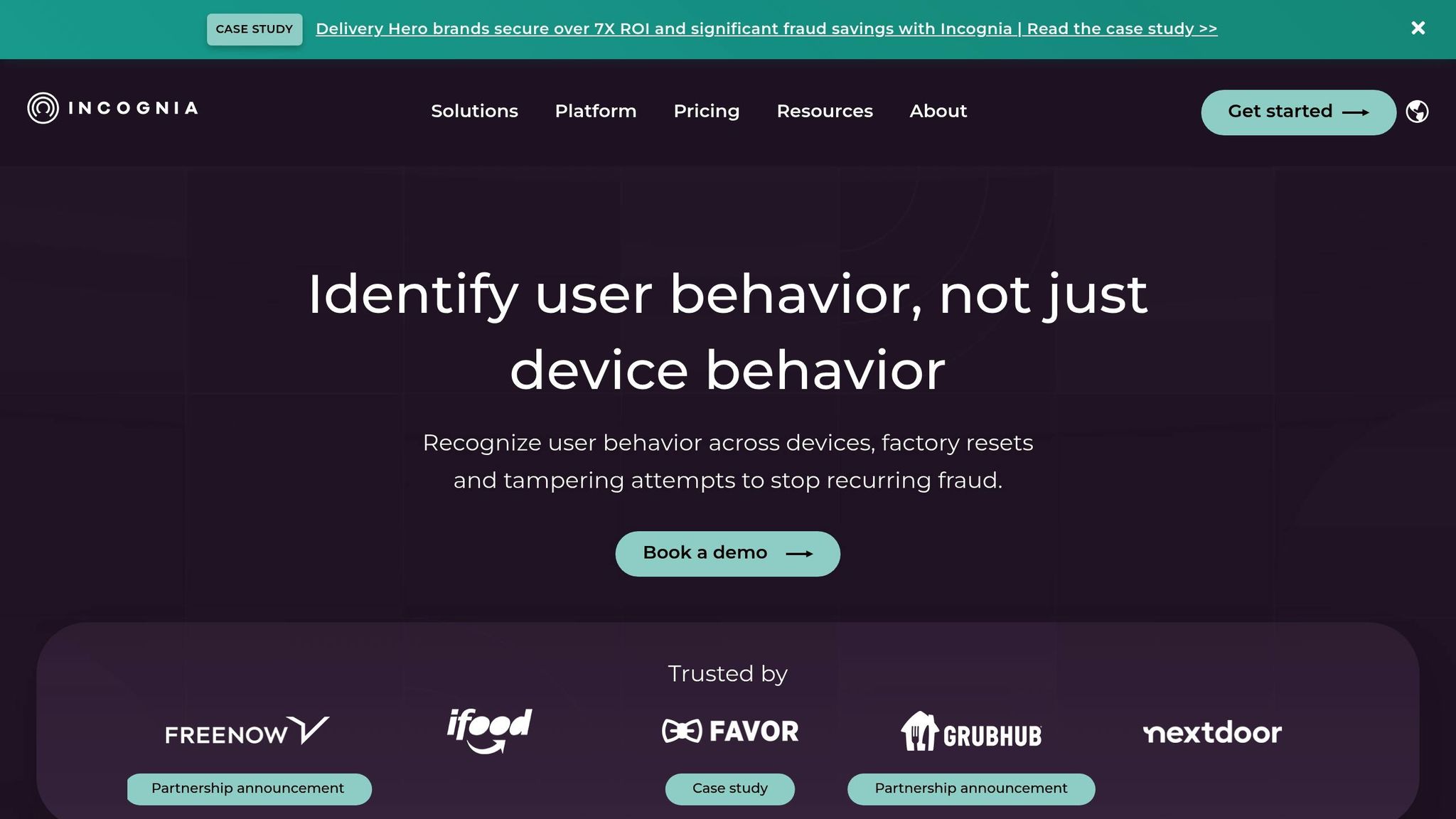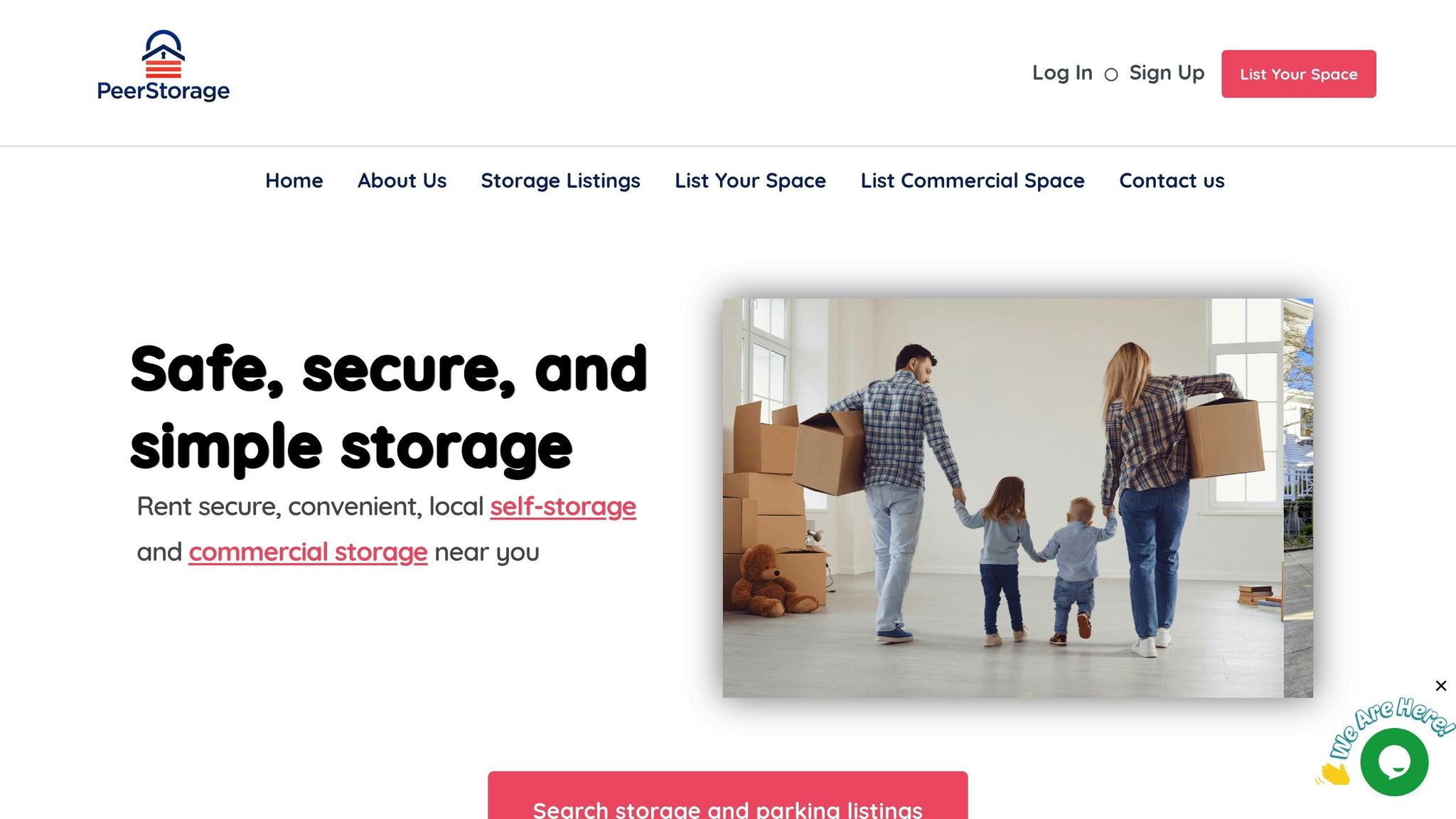Ultimate Guide to Marketing Metrics for Storage Hosts
- October 6, 2025
- Self Storage
Tracking marketing metrics is the key to understanding your storage hosting performance. These numbers reveal how well your efforts attract renters,…
Read More
User verification is the key to creating safer peer-to-peer marketplaces. It addresses common concerns like fraud, fake listings, and property misuse by confirming the identities of both renters and hosts. This process ensures accountability, reduces risks, and encourages more confident participation in storage transactions.
Here’s how it works:
Verification benefits everyone by:
Platforms like PeerStorage prioritize user privacy by encrypting data, limiting storage, and complying with U.S. privacy laws. These measures ensure personal information is secure while fostering a safer marketplace for all.

User verification adds crucial layers of security to storage marketplaces, turning what could be anonymous interactions into accountable, secure exchanges – all while respecting privacy. By implementing thorough verification systems, these platforms create a trustworthy environment where both renters and hosts feel confident. Users can interact knowing the other party is legitimate, without needing to expose unnecessary personal details.
For scammers, platforms with strong verification measures are simply not worth the hassle. The need for detailed documentation and extra steps raises the barrier for fraudulent activity, making it less appealing. Features like requiring government-issued IDs and multi-step verification processes help prevent fake accounts and misuse. Plus, verified users are more likely to engage in professional and transparent communication, which reduces disputes.
Modern storage marketplaces rely on various methods to confirm user identities:
These verification methods are tailored to suit the needs of both renters and hosts, ensuring a secure experience for everyone involved.
The verification process is customized for renters and hosts, reflecting their different roles and responsibilities in storage transactions.
For renters, the process starts with uploading a state-issued ID, like a driver’s license, followed by phone and email verification. U.S.-based renters may also go through additional checks using secure third-party services. To confirm payment details, renters must verify their credit card, bank account, or digital payment method through small authorization charges, proving they control the linked payment method.
For hosts, the requirements are more detailed since they’re opening their property to others. Along with standard identity checks, hosts need to provide proof of property ownership or lease agreements to confirm they have the right to rent out the space. They must also verify the physical location by uploading photos of the property from various angles or including verification codes in the images. In some cases, hosts offering spaces for commercial use or high-value storage may need to provide proof of insurance or liability coverage to ensure they meet the necessary requirements.
Renters are typically verified within 24–72 hours, while the process for hosts can take 3–7 business days due to the additional documentation involved. During this time, users can browse listings but may be restricted from completing transactions until fully verified. This structured approach underscores the platform’s commitment to creating a secure and transparent marketplace.
User verification doesn’t just improve safety – it reshapes the entire experience for both renters and hosts. By turning storage marketplaces into secure and professional platforms, verification builds trust and confidence, making every interaction smoother and more reliable.
User verification is a strong line of defense against fraud, helping to minimize financial losses and security risks. By requiring strict identity and payment verification, it creates a barrier that deters scammers.
Platforms with robust verification systems experience fewer fraud-related issues, which in turn builds greater confidence among users.
Verification badges act as trust signals, encouraging higher engagement from users. When renters see that hosts have verified their identity and property ownership, it eases concerns and makes the booking process feel more secure. This trust complements safety measures already in place, creating a more accountable community.
Verified listings tend to attract more renters, as these badges are viewed as signs of reliability. This trust translates into higher booking conversion rates and smoother interactions. Hosts, in turn, feel more at ease accepting bookings from renters who have also completed verification.
Additionally, verified users typically maintain better communication, providing clear property details and staying professional throughout the rental period.
Verification elevates the overall quality of the marketplace, encouraging a community of dedicated users who value their reputation. Verified renters and hosts tend to act more responsibly, leading to better property care, accurate descriptions, respectful behavior, and adherence to rental agreements.
Over time, this creates a reputation-driven ecosystem where having verified status becomes a competitive edge. Users are motivated to maintain their verification and positive reviews, fostering long-term relationships between renters and hosts. The result is a marketplace where everyone feels secure, respected, and confident in their transactions.
User verification plays a key role in building trust within storage transactions, but it also brings up valid concerns about privacy and data security. People are understandably cautious about sharing personal information online, especially with recent high-profile breaches making headlines. Fortunately, modern verification systems are designed with advanced protections to safeguard user data while maintaining the trust essential for peer-to-peer marketplaces.
Here’s how your data is kept secure.
Top-tier verification systems rely on bank-level encryption, ensuring that sensitive information is encrypted during transmission and securely stored in databases with strict access controls. This means your personal data is shielded from unauthorized access at every step.
Platforms also limit the amount of data they collect and store. For instance, many systems only retain a confirmation that your identity was verified, rather than keeping a full copy of your ID. This approach minimizes the risk of exposing sensitive information.
To further protect users, these systems comply with U.S. privacy laws like the California Consumer Privacy Act (CCPA). These regulations grant you rights such as knowing what data is collected, requesting corrections, and even asking for data deletion in certain cases.
Additionally, many platforms outsource identity checks to specialized third-party verification services. These companies focus exclusively on secure identity verification and often implement stronger security measures than individual platforms could manage on their own.
Regular security audits are another critical layer of protection. Leading providers undergo independent assessments and maintain certifications like SOC 2 Type II, which reflect their commitment to safeguarding user data. These measures ensure your information stays secure while trust in the platform grows.
Misunderstandings about user verification can lead to unnecessary worries. Let’s clear up some common myths with the facts:
| Myth | Reality |
|---|---|
| Platforms permanently store copies of your documents | Most systems only retain verification results, not the original documents |
| Your personal details are shared with other users | Verified badges are displayed, but personal information remains private |
| Verification data is used for marketing purposes | Reputable platforms use the data solely for safety and security |
| Government agencies can freely access your data | Legal access requires proper procedures, such as warrants or subpoenas |
| Your data is stored indefinitely | Many platforms let users request data deletion when closing accounts |
These facts show that privacy is preserved even as verification enhances marketplace trust.
Data retention policies vary, but most platforms allow users to request deletion of their verification data when they decide to stop using the service. This gives you control over how long your information remains in the system.
The verification process prioritizes confirming identity and payment details without overreaching into unnecessary data collection. This targeted approach balances privacy concerns with the need for security, making marketplaces safer for everyone.
For additional reassurance, many platforms publish transparency reports detailing how often verification data is accessed for legal reasons. These reports consistently show that such occurrences are rare, reinforcing that your data is used only for its intended purpose: fostering trust and safety.

PeerStorage takes marketplace trust seriously, implementing strong measures to ensure secure peer-to-peer storage transactions. Recognizing that trust is the foundation of a successful platform, PeerStorage prioritizes creating a safe space for both renters and hosts through thorough identity verification and stringent data protection.
To guarantee that every listing is authentic and secure, PeerStorage has a detailed verification process in place. Once a user’s identity is verified, the platform deletes ID images, keeping only the verification status linked to user profiles. This approach not only protects user privacy but also reduces the risk of data exposure, reinforcing confidence in the platform. These measures are designed to benefit users across the United States.
PeerStorage’s focus on safety and privacy gives U.S. users an added layer of confidence. By retaining only the necessary verification status, the platform minimizes data risks, enabling users to rent or list storage spaces with peace of mind. This emphasis on security and privacy underscores PeerStorage’s dedication to building a dependable and trustworthy marketplace.
Trust is the backbone of peer-to-peer storage marketplaces, and user verification plays a critical role in establishing that trust. By implementing identity checks, these platforms create an environment where both renters and hosts can interact confidently, knowing they’re dealing with verified individuals rather than unknowns.
Verification goes beyond just preventing fraud – it fosters a sense of community. Verified marketplaces often see greater user engagement, improved interactions, and stronger long-term relationships. When users know everyone has undergone the same verification process, they feel more at ease sharing their storage spaces or entrusting their belongings to others.
While concerns about privacy are valid, they shouldn’t discourage users from embracing verification systems. Platforms like PeerStorage demonstrate that security and privacy can coexist. By carefully managing data and retaining only the essential details needed for verification, these platforms protect user identities while maintaining the trustworthiness of the marketplace.
As the peer-to-peer storage industry continues to grow across the United States, user verification is quickly becoming more of a necessity than an option. Platforms that prioritize these systems create safer, more reliable spaces for everyone involved – offering renters peace of mind and providing hosts with dependable tenants.
For users, choosing a verified platform means stepping into a marketplace where trust isn’t just a claim; it’s built into every transaction, ensuring a safer and more dependable experience for all.
User identity verification is essential for fostering trust and maintaining safety in peer-to-peer storage marketplaces. By verifying user identities, platforms can deter fraud, minimize security threats, and keep bad actors at bay. This ensures a more secure environment where users feel confident engaging with others who have been vetted.
When identities are verified, it builds a sense of reliability, encouraging more transactions and enhancing the overall user experience. For platforms like PeerStorage, this process is crucial in creating a secure and dependable space where users can rent or list storage options without worry.
PeerStorage has implemented a detailed verification process to create a trustworthy environment for both renters and hosts. This process requires users to provide a government-issued ID, such as a driver’s license or passport, along with a real-time selfie to confirm their identity. To further enhance security, automated identity checks and document verification are also in place, ensuring a safe and dependable marketplace for all participants.
PeerStorage takes your privacy and security seriously by implementing thorough verification processes. These include confirming identities with government-issued IDs and biometric checks, such as selfie verification. These measures help ensure that users are genuine while safeguarding your personal information.
To further protect your data, PeerStorage enforces strict privacy protocols designed to block unauthorized access, misuse, or sharing. The platform is dedicated to providing a secure and reliable experience for every user.
Join The Discussion